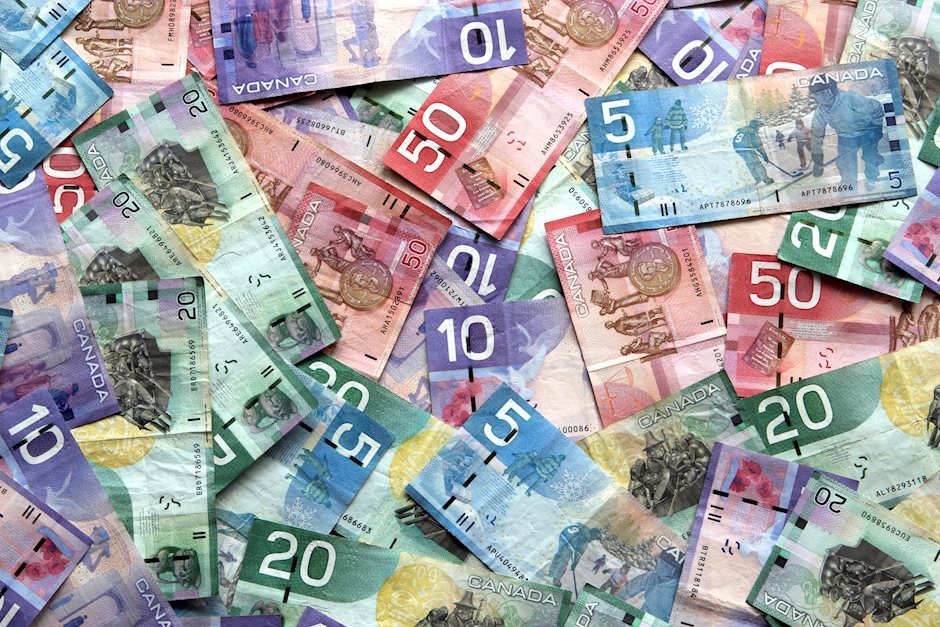USD/CAD struggles for a firm intraday direction, consolidates above 1.3500 mark
- USD/CAD seesaws between tepid gains/minor losses amid mixed fundamental cues.
- A modest USD uptick lends support amid bets for a larger interest rate cut by the BoC.
- Dovish Fed expectations and a positive risk tone cap gains for the USD and the major.

The USD/CAD pair kicks off the new week on a subdued note and oscillates in a narrow band, above the 1.3500 psychological mark through the Asian session. The mixed fundamental backdrop, meanwhile, warrants some caution before positioning for a firm near-term direction and extension of the pair's goodish rebound from the 1.3420 area, or the lowest level since March 8 touched last week.
The US Dollar (USD) attracts some haven flows amid the risk of a further escalation of geopolitical tensions in the Middle East. The Canadian Dollar (CAD), on the other hand, is weighed down by bet for a bigger interest rate cut by the Bank of Canada (BoC). This, in turn, acts as a tailwind for the USD/CAD pair, though a combination of factors hold back traders from placing fresh bullish bets and caps the upside.
The global risk sentiment gets an additional boost in reaction to more stimulus announced by China over the weekend. This, along with expectations for a more aggressive policy easing by the Federal Reserve (Fed), keeps a lid on any meaningful upside for the safe-haven buck and the USD/CAD pair. In fact, the markets are pricing in a greater chance of another oversized rate cut by the Fed at its November meeting.
Meanwhile, the possibility of a widening Middle East conflict, to a larger extent, overshadows worries about slowing demand in China – the world's top oil importer – and lends support to Crude Oil prices. This, in turn, is seen underpinning the commodity-linked Loonie and contributing to capping the USD/CAD pair as traders now look to Fed Chair Jerome Powell's speech for a fresh impetus later during the US session.
Canadian Dollar FAQs
The key factors driving the Canadian Dollar (CAD) are the level of interest rates set by the Bank of Canada (BoC), the price of Oil, Canada’s largest export, the health of its economy, inflation and the Trade Balance, which is the difference between the value of Canada’s exports versus its imports. Other factors include market sentiment – whether investors are taking on more risky assets (risk-on) or seeking safe-havens (risk-off) – with risk-on being CAD-positive. As its largest trading partner, the health of the US economy is also a key factor influencing the Canadian Dollar.
The Bank of Canada (BoC) has a significant influence on the Canadian Dollar by setting the level of interest rates that banks can lend to one another. This influences the level of interest rates for everyone. The main goal of the BoC is to maintain inflation at 1-3% by adjusting interest rates up or down. Relatively higher interest rates tend to be positive for the CAD. The Bank of Canada can also use quantitative easing and tightening to influence credit conditions, with the former CAD-negative and the latter CAD-positive.
The price of Oil is a key factor impacting the value of the Canadian Dollar. Petroleum is Canada’s biggest export, so Oil price tends to have an immediate impact on the CAD value. Generally, if Oil price rises CAD also goes up, as aggregate demand for the currency increases. The opposite is the case if the price of Oil falls. Higher Oil prices also tend to result in a greater likelihood of a positive Trade Balance, which is also supportive of the CAD.
While inflation had always traditionally been thought of as a negative factor for a currency since it lowers the value of money, the opposite has actually been the case in modern times with the relaxation of cross-border capital controls. Higher inflation tends to lead central banks to put up interest rates which attracts more capital inflows from global investors seeking a lucrative place to keep their money. This increases demand for the local currency, which in Canada’s case is the Canadian Dollar.
Macroeconomic data releases gauge the health of the economy and can have an impact on the Canadian Dollar. Indicators such as GDP, Manufacturing and Services PMIs, employment, and consumer sentiment surveys can all influence the direction of the CAD. A strong economy is good for the Canadian Dollar. Not only does it attract more foreign investment but it may encourage the Bank of Canada to put up interest rates, leading to a stronger currency. If economic data is weak, however, the CAD is likely to fall.
Author

Haresh Menghani
FXStreet
Haresh Menghani is a detail-oriented professional with 10+ years of extensive experience in analysing the global financial markets.

















